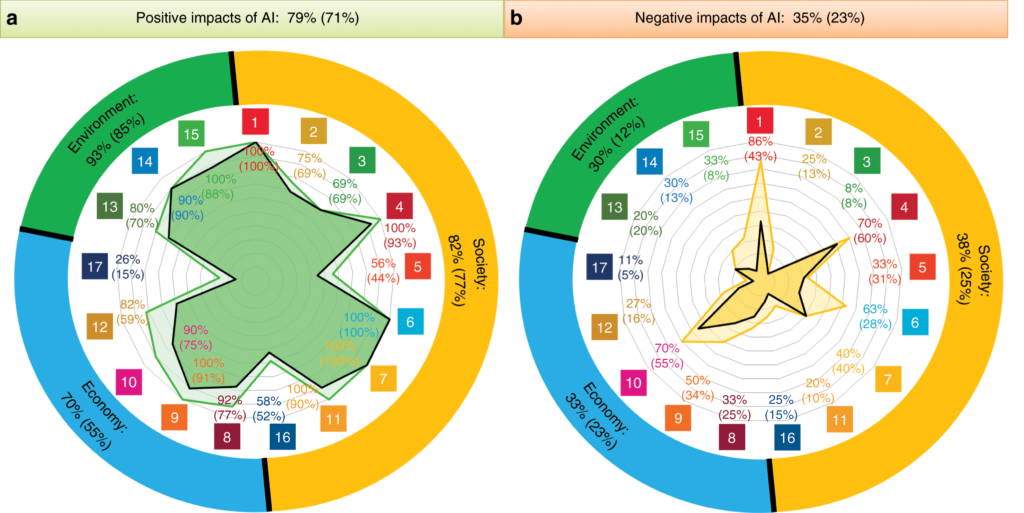Artificial intelligence (AI) is rapidly transforming our world, but what impact will it have on achieving the United Nations’ Sustainable Development Goals (SDGs)?
A fascinating new study published in Nature Communications sheds light on this critical question. The researchers conducted an extensive analysis of how AI could affect all 17 SDGs and their 169 targets. Their findings reveal a nuanced picture – AI has immense potential to accelerate progress on sustainable development, but it also poses significant risks if not managed carefully.

The Good: AI as an Enabler
The study found that AI could positively contribute to 134 targets across all 17 SDGs. Some key areas where AI shows promise include:
- Poverty reduction through better resource allocation and early warning systems
- Improved healthcare via AI-powered diagnostics and personalized medicine
- Enhanced education through adaptive learning platforms
- Smart cities and grids to boost energy efficiency
- Climate change mitigation and adaptation
For example, AI can analyze satellite imagery to identify areas of poverty and direct aid more effectively. In healthcare, AI algorithms are already demonstrating the ability to detect diseases like cancer as accurately as human doctors.
The Bad: AI as an Inhibitor
However, the researchers also identified 59 targets where AI could potentially hinder progress. Some key risks include:
- Increased inequality due to job displacement and the digital divide
- Privacy and security concerns from data-hungry AI systems
- Environmental costs of energy-intensive AI computing
- Algorithmic bias leading to discrimination
- The use of AI for surveillance, oppression, and manipulation
For instance, while AI may boost productivity, the economic gains could disproportionately benefit those who own and control AI technologies, exacerbating inequality. There are also concerns about AI systems perpetuating human biases related to race, gender, and other factors.
The Path Forward
The study makes it clear that the impact of AI on sustainable development is not predetermined. With proper governance and foresight, we can harness AI’s potential while mitigating its risks.Some key recommendations include:
- Developing robust policy frameworks to guide AI development
- Investing in AI safety research
- Promoting inclusive and participatory approaches to AI
- Focusing AI applications on pressing challenges in developing countries
- Enhancing AI literacy and education
As we stand at this critical juncture, it’s imperative that we shape the future of AI to support, rather than undermine, our sustainable development goals. By taking a proactive and thoughtful approach, we can ensure AI becomes a powerful force for good in the world.
What are your thoughts on the potential of AI to impact sustainable development?
Oscar Rodríguez, PhD is currently an AI Engineer at LumApps (France). He holds a Ph.D. in Computer and Control Engineering from Politecnico di Torino, with a focus on AI. His expertise includes Knowledge Representation and Reasoning, Natural Language Processing (LLMs) and Machine/Deep Learning. As president of Greenminds, he applies AI to drive sustainability initiatives.

Leave a Reply